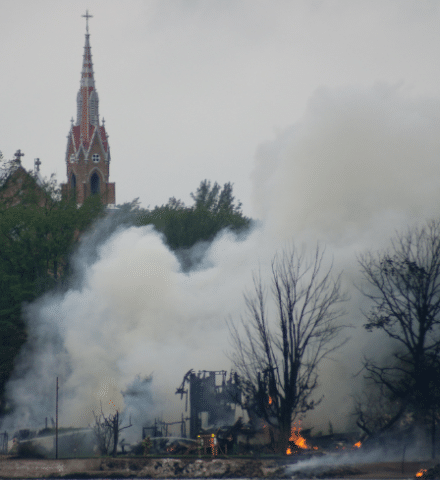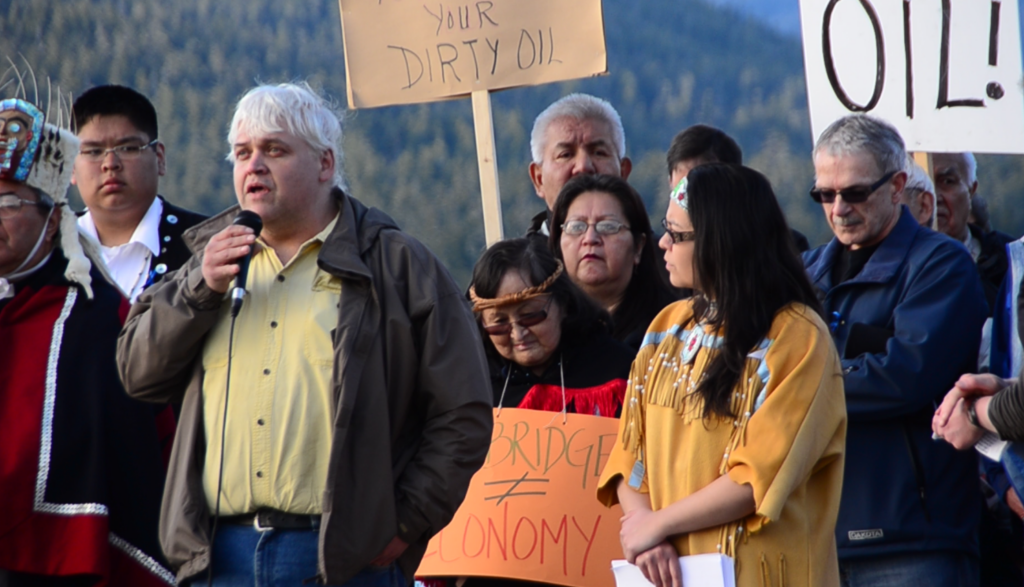When North Dakota Congressman Kevin Cramer was asked recently if it was scientifically possible to make Bakken crude oil safer by stripping out the explosive natural gas liquids with a process like oil stabilization, his response was quite telling.
“So scientifically can you do it? Sure, but you have to look at it holistically and consider all of the other elements including economics, and is the benefit of doing something like that does that trump other things like speed of trains, and what kind of cars,” he said.
This is very similar to the comments made by Lynn Helms of the North Dakota Department of Mineral Resources according to the July 29 meeting minutes provided to DeSmogBlog by the Industrial Commission of North Dakota.
“In response to a question regarding other mechanisms besides oil conditioning in the field, Mr. Helms stated there are other mechanisms — none of them without a significant downside….It makes sense to do the conditioning in the field. There are other options to do it downstream somewhere in a very large and very expensive operation.”
In a June 24 e-mail obtained by DeSmogBlog through a freedom of information request, Helms identified himself as “the primary contact for Governor Dalrymple’s team on the crude safety issue” in response to an inquiry from the Department of Energy about who would be working on the issue of Bakken crude oil safety.
As the point person on this issue for North Dakota, Helms’ opinions carry significant weight. And just like Congressman Cramer, Helms is pointing out the “significant downside” of stabilization, which is that it is an expensive operation.
It is well established that stabilization works and would make oil trains much safer. Not even North Dakota politicians are arguing that point anymore. But the industry doesn’t want to pay for it. And right now, the only ones who could mandate them to stabilize the oil via new regulations are the three members of the Industrial Commission of North Dakota.
What About The Feds’ Oil-By-Rail Regulations?
The reason North Dakota politicians are discussing this issue at all is because the federal government has essentially punted the question.
In the 200 pages of new proposed oil-by-rail regulations released in July, there is not a single line about requiring the oil or rail companies to stabilize the oil prior to shipping.
Stabilization is a process that removes the explosive natural gas liquids from the oil and is required by pipeline companies. This process would turn the current Bakken “bomb trains” into simple oil trains. They would still pose a threat of oil spills, but would no longer threaten to kill people in massive explosions like the one in Lac-Megantic, Quebec, or be a target for terrorism.
While the proposed regulations don’t require stabiliazation, they do include three questions that indicate lawmakers are aware that stabilizing or “degassifying” the crude makes it safer and that producers have the ability to reduce the volatility of crude oil prior to shipping it by rail.
Is the current exception for combustible liquids sufficient to incentivize producers to reduce the volatility of crude oil for continued use of existing tank cars?
Would an exception for all PG III flammable liquids further incentivize producers to reduce the volatility of crude oil prior to transportation?
What are the impacts on the costs and safety benefits of degasifying to these levels?
As previously reported by DeSmogBlog, the regulators in charge of finalizing the new proposed oil-by-rail regulations are big believers in cost-benefit analysis. And looking at their questions, it is clear they know the oil can be made less volatile. But they want to hear more from the industry about the costs of doing this before doing anything. And instead of requiring stabilization, they are looking for ways to “incentivize” the producers to do it.
Oil Conditioning vs. Oil Stabilization
The North Dakota Industrial Commission is holding a hearing on September 23rd during which it is requesting input on how to make the Bakken crude oil safer for transport. The headline of its press release, “Hearing set on oil conditioning practices,” almost ensures that oil stabilization will never be required in North Dakota.
Oil conditioning is not the same as oil stabilization. Oil conditioning can be done with all of the existing equipment already in the field in North Dakota and thus the cost is minimal. However, in situations where the industry needs to ensure it strips out all the volatile natural gas liquids from the oil, as in the Eagle Ford formation in Texas, they use a different process called stabilization.
Helms and the members of the Industrial Commission like to cite the North Dakota Petroleum Council Study on Bakken Crude Properties when claiming that Bakken crude is no different than other crude oils and thus doesn’t require stabilization. However, that very report makes it clear that conditioning, done with the equipment currently available, is insufficient and was never designed to achieve the type of results expected from stabilization.
From the report, prepared by industry consultant Turner and Mason:
The data consistency [sic] indicates that field equipment is limited in its ability to significantly impact vapor pressure and light ends content.
This is consistent with the expected capabilities of the equipment.
The field equipment is designed to separate gas, remove water and break emulsions to prepare crude for transport, and not remove significant levels of dissolved light ends from the crude.
Meanwhile, at the August 26 meeting of the North Dakota Industrial Commission, Helms once again acknowledged the effectiveness of stabilization, as reported by Petroleum News: “This is very routinely done with high gravity condensate — oil that condenses out of a gas well as it is produced,” Helms said. “That has to be stabilized before it can move through the system.”
Helms word choice is telling. Oil that “has to be stabilized before it can move through the system.” Oil that is moved by pipeline has to be stabilized before it can be moved because pipeline companies require it. The rail companies do not.
Despite his acknowledgement of how stabilization is routine in the pipeline business, at the August meeting, Helms was also sure to point out that in North Dakota they expected to choose conditioning as their solution, as reported by Petroleum News.
Helms agreed, saying conditioning is likely more suitable for North Dakota since the equipment is already in place on well sites but he’d like to hear from others at the upcoming hearing.
“We haven’t closed the door to (stabilization),” Helms said. “We want to hear what people have to say.”
However, if the North Dakota Industrial Commission actually wanted to hear what people have to say about stabilization, the press release about the September 23rd hearing probably should have actually mentioned stabilization. It doesn’t.
The North Dakota Industrial Commission
If there is going to be any regulation requiring stabilization of the Bakken crude it will require the three members of the North Dakota Industrial Commission to make it happen.
Governor Jack Dalrymple is one member of the commission. And his point man on this issue, Helms, has already made it clear he supports conditioning over stabilization.
North Dakota Attorney General Wayne Stenehjem is another member. When a report by the Pipeline and Hazardous Safety Materials Administration recently concluded that Bakken oil was more flammable than most other crude oils, Stenehjem responded to the science by saying, “It seems like they are picking on us.”
The third member of the commission is Agricultural Commissioner Doug Goehring. At the August 26th meeting of the commission, Petroleum News reported that Goehring opposed stabilization for an unlikely reason for someone who helped oversee the massive expansion of the Bakken oil production.
Agriculture Commissioner Doug Goehring voiced his concern with dotting the landscape with stabilizer units.
“We’ve been trying hard to shrink that footprint out there on the landscape, and that’s going to make that awfully difficult.”
So in all likelihood, stabilization is off the table and conditioning will be the new regulation. Helms and others often say conditioning is already being done because the equipment is already in the field. Yet, according to the minutes from the July meeting of the Industrial Commission, Governor Dalrymple said: “Right now we are assuming producers are doing conditioning but we do not have a mechanism to verify that.”
So, let’s get this straight. It is more than a year after the explosion of a Bakken crude train in Lac-Megantic that killed 47 people. And it’s been more than eight months since a train of Bakken crude exploded in Casselton, ND. And the best the regulators can do is hold a hearing to talk about how to do regulate a practice that’s inadequate and they already assume is being done?
Subscribe to our newsletter
Stay up to date with DeSmog news and alerts







